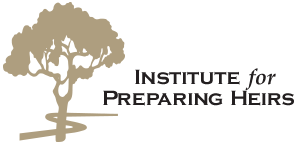Role Of Executor: New Thinking Your Clients Need to Know

At one time or another, many of your clients are faced with a request from a colleague, friend or family member: “I’d like you to be my executor.” Before answering “yes,” clients need to know what the role involves, and more importantly, if they can fulfill the duties in a manner that honors the requestors’ intents and the law. On the flip side, clients choosing executors now have access to new thinking when it comes to their beneficiaries and the future of their families.
This is the second in a series of articles based upon the new book, Executors, Trustees and Beneficiaries: Honoring The Intent, The Law and Emerging Trends, from the Institute for Preparing Heirs. This article focuses on new thinking around the role of executor for both individuals asked to serve and those who are doing the asking.
What is an executor?
An executor is a person named in a will, who is responsible for making the decisions necessary to successfully carry out a decedent’s final wishes. Those decisions can be financial and/or personal. Executors “step into the decedents’ shoes” and have rights and powers to wrap up the decedents’ personal affairs. According to the 2014 U.S. Trust Insights on Wealth and Worth survey of affluent families, when asked what people considered in naming an executor, 78% said “trustworthiness.”
Advice enlightened advisors offer affluent clients
Typically, clients seek advice from wealth advisors, estate attorneys and tax advisors to prepare their assets for transfer to beneficiaries—spouses, family members and others they hold dear. What commonly is overlooked is the preparation of the beneficiaries to receive and manage the assets in a manner that honors the benefactor by carrying forward that individual’s values and legacy.
Enlightened advisors trained and equipped in engaging client families in inheritance conversations can offer clients new thinking and new tools to prepare the heirs and beneficiaries, and to aid in choosing an executor.
- Offer a broader definition of how the family defines its wealth to include more than its money. Family wealth also includes family name, knowledge, health, spirituality, family unity and support of community
- Suggest the family hold regular family meetings to encourage conversations aimed at strengthening trust among family members and opening channels of communication. A topic can include the selection of an executor, one who will work with the beneficiaries to honor the intent of the benefactor’s wishes
- Explain the value of developing a Family Wealth Mission Statement that spells out how the family has collectively agreed to use its wealth. This Statement helps the family’s professional advisors when drafting estate documents and executors when following the wishes of the benefactor
The authors of Executors, Trustees and Beneficiaries, Vic Peisser and Vanessa Terzian, recommend when choosing an executor: “Keep it simple, and select an executor who can make decisions as necessary.” When it comes to soliciting family members for the role, they caution: “Family members who accept executor responsibility may experience the ‘after effects’ of an important decision that displeases one or more other family members, and that is very difficult to ‘shake’ as life moves on.”
According to the U.S. Trust survey referenced above, 25% of respondents said the most difficult part of serving as an executor (among those who had served) was “managing expectations/disagreements among heirs or beneficiaries.”
New thinking about the role of executor
Being a good executor starts by asking the right questions to understand the role and the impact the executor can have on the future of not only the beneficiaries, but an entire family for generations to come!
The authors write, “ . . . you may be willing to accept a friend or family member’s request to be an executor, but are you fully informed on the family dynamics and prepared for what your responsibilities may entail?” Family dynamics play a far greater role than most imagine. When issues within the family involving trust and communication go unresolved, family unity is put to the test once the benefactor has passed. Enlightened advisors can create awareness of the risks of wealth transition in affluent families in a number of ways: Offer books and articles on the topic, host a client event with a speaker knowledgeable in the non-financial impacts of wealth transfer, refer resources (family consultant/coach) to families who seek outside help.
Executors, Trustees & Beneficiaries asks and answers more than 100 questions relating to the roles of executors, trustees and beneficiaries. It also includes helpful checklists and family story examples. A few of the questions and answers related to the role of executor are contained below.
What are some of the skills that make for a good executor?
Depending upon the situation, the universal skills that seem to be most valued surround the characteristics of personal integrity, patience, a sense of calm, a desire to avoid drama, and the ability to communicate clearly. Closely on the heels of those characteristics are the desirable abilities to work easily with other professionals, careful reading and understanding of the written requirements for the executor, and “staying close” to the appropriate professional advisors.
How does an executor candidate evaluate a potential executor job?
In most situations, the proposed executor is presented with a choice. In some cases, it’s a nomination by default (only child, sole partner, etc.). Some factors that should be considered are as follows, in order of priority:
- Do I want to serve in this role, or do I feel an obligation to serve?
- Am I competent and emotionally able to carry out this task?
- Do I have access to wiser and more experienced parties as needed?
- How much time is this likely to take?
- What is the compensation for my time and emotional investment?
- How contentious or disputative are the issues likely to be?
- Are my personal risks covered (liability, etc.)?
- What is the likely impact on my family and those who depend on me?
- Will I have the proper tools and resources to serve in this capacity?
What are some of the things most commonly done by executors?
Most frequently, they are carrying out the terms of the document that directs their permissible activities. If it’s an estate plan, they are carrying out the estate plan. That may mean making distributions of assets in accordance with the decedent’s wishes, or answering questions from the beneficiaries, etc. Quite often an executor will be carrying out the obligations he/she took on upon acceptance of being executor for a Medical Power of Attorney, or a simple Power of Attorney. Do what the document(s) permit, don’t be too creative, and avoid any actions that the document(s) specifically prohibit. An executor’s job consists primarily of:
- Administering the founder’s wishes, including making those “wishes” known in advance to the people who are likely to be impacted by the founder’s wishes (for example, decisions made where an executor has a Medical Power of Attorney which may be a life or death decision)
- Making the required periodic reports to the appropriate state, county, or federal agencies (death certificates, etc.)
- Keeping the beneficiaries informed, and being accessible to all beneficiaries
- Distributing the assets in accordance with the instructions in the will, and making adjustments in event of refusal or a beneficiary’s inability to accept
- Working with outside professional advisors to:
- Manage the assets, and keep track of every distribution
- Keep the books and detailed “remaining assets” inventories
- Document interactions and decisions with beneficiaries and a solid “paper trail”
The following story from the book, illustrates why it’s important to understand all of the duties listed above before saying, “Yes.”
“John and Emily were getting their affairs in order after 40 years of marriage and two children (now also grown and married with children). Their attorney said to the two of them, “I suppose each of you wants to be the executor for the Durable Medical Power of Attorney for one another.” They nodded, and moved on to the next item on the list. Twenty months later, with Emily hospitalized and comatose from an auto accident, the doctors turned to John and said, “John, it’s time to let Emily go . . . and it’s your responsibility to approve that decision.” John, horrified at the thought of losing his spouse of 42 years, was shocked by the apparent callousness of the attending physicians. He said, “I can’t do it . . . I just can’t do it.” Unable to fulfill his job as executor, a long legal wrangle began between the insurance company, the hospital, and John’s and Emily’s children. After a long, expensive, and ultimately fruitless struggle, John said, “I never knew what I was getting into as executor of a Medical Power of Attorney. It’s a horrible responsibility that I don’t want, asking for decisions I can’t make.” He began to wonder who he could persuade to take over Emily’s responsibilities as executor for his Medical Power of Attorney.”
Also from the book:
What’s the best thing that can happen as a result of being a good executor?
Frankly, it’s the personal reward (beyond any financial compensation) that one has carried out the wishes of the person that appointed him/her as executor. It’s a personal feeling of, “I have done what I was asked to do as if my predecessor were here beside me . . . and everyone sees that.” The next best things are avoiding being the subject of any litigation during your tenure and contributing to the well being of family unity. Perhaps the best testimonial an executor could have would be for the beneficiaries (or other persons impacted) to agree: The executor was really in tune with the benefactor’s wishes, communicated clearly, and handled matters just like Mom or Dad would have done if they were here today.
Another story from the book shows the positive impact an executor with sensitivity can make:
“An executor of an estate was a good friend of the decedent. At the time the decedent passed, he was not very close to his children, but named them as heirs of his estate. Rather than selling the tangible personal property and distributing the proceeds, the executor took photographs of the various pieces (paintings, statues, vases, and even some of the clothes) and put a catalogue of the items together. He then sent the catalogue to each beneficiary across the country and asked that they to talk with one another and reach an agreement on their choice of items. He was surprised when each and every item was chosen, and none was sold. The executor understood the emotional importance of memories that such items may hold, despite distance and strained relationships.”
Introducing new thinking and new tools to clients is an opportunity for advisors to engage with the entire family. Studies show that advisors who do not have a meaningful relationship with the heirs are more than likely to lose the heirs as clients once wealth transitions.

